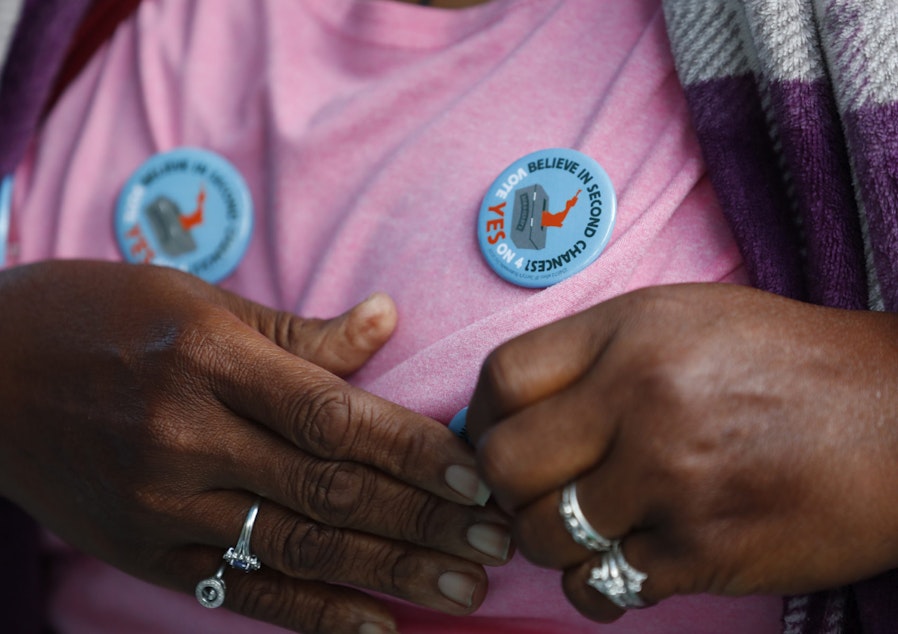Ballot Roundup: Florida Restores Felons' Voting Rights; Michigan OKs Recreational Marijuana

American voters shifted the balance of power in Washington on election night. But they also weighed in on more than 100 ballot measures.
Some of those measures were significant — Florida restored voting rights to 1.5 million felons. Others, quirky — California voters resoundingly said they no longer wanted to change their clocks twice a year.
Here’s a roundup of a few pivotal ballot questions, and a look at their implications in the states that took them up:
Florida’s Amendment 4 Passes
In a state known for razor-thin elections, Floridians approved changes to their constitution that would re-enfranchise 1.5 million felons who had lost their right to vote. Florida was one of just a handful of states that took that right away from felons permanently.
Sponsored
“This is a really big deal for me,” says convicted felon Neil Volz, political director of the Florida Rights Restoration Coalition, a group that backed Amendment 4. “This is a big deal for the 1.5 million returning citizens in the state of Florida who got their voices back last night. And I’m looking forward to voting in the next election. And oh, my gosh, it just feels amazing to say that out loud.”
The amendment surpassed the 60 percent threshold needed to change the state’s constitution. It could change the outcome of Florida’s notoriously close elections. But Volz does not agree with the idea that measure will favor Democrats.
“Returning citizens represent all walks of life and all backgrounds,” he says.
Floridians like Richard Harrison, a Tampa-area lawyer and founder of Floridians for a Sensible Voting Rights Policy, had said they opposed the measure.
“We should not assume that all 1.5 million felons and everybody sitting in Florida state’s prison system have all become model citizens,” Harrison told Here & Now‘s Chris Bentley prior to Election Day. “Clemency is not an entitlement, it’s not a right — it is an act of mercy by the state of Florida.”
Sponsored
Anti-Abortion Measures In The South
Voters in Alabama and West Virginia also made important changes to their state constitutions.
Amendment 2 in Alabama added new language to the document that recognizes and supports “the sanctity of unborn life.”
West Virginia passed a similar amendment and adopted language that states that nothing in the constitution “secures or protects a right to abortion or requires the funding of abortion.”
Why is that important? Look at the makeup of the Supreme Court, with Trump-appointed conservatives like Neil Gorsuch and Brett Kavanaugh on the bench. If the court overturns the landmark abortion ruling Roe v. Wade, as many conservatives hope it will, these ballot measures would come into effect. In other words, states are positioning themselves for a shift on this contentious issue in the courts.
Sponsored
Red States Expand Medicaid
Restrictions on abortion in conservative states are hardly unheard of. But a few red states did something surprising on a different polarizing issue: Voters in Utah, Nebraska, and Idaho approved the expansion of their Medicaid programs. More than a quarter of a million people in those three states could now get additional coverage.
It’s a significant step for conservatives. Many Republicans have promised to roll back the Affordable Care Act altogether. But doing so will get increasingly difficult now that 36 states and the District of Columbia have given a nod to one of the law’s key provisions.
It’s worth noting: Montana voters rejected a tax on tobacco products to expand their Medicaid program.
Environmental Questions Go Down In West
Sponsored
Arizona and Washington state did not back two environmental measures intended to address climate change.
Arizona’s Proposition 127 would have required 50 percent of the state’s power to come from renewable sources. The proposition failed by nearly 40 percent even though Arizona is one of the sunniest states in the U.S. Arizona’s main utility said the new standards would cost a typical household $1,000 or more per year.
The economic argument also carried weight in Washington state, where voters rejected — again — an effort to tax carbon emitters. The state would have charged a first-in-the-nation fee starting at $15 per ton of carbon emissions.
Interest groups poured a tremendous amount of money into both of these ballot questions.
‘Green’ Light For Marijuana In Michigan
Sponsored
Michigan residents will be able to use marijuana recreationally by the end of the year. It’s the first Midwestern state to approve the drug for casual use, and the 10th overall. Possessing, selling or using marijuana is still illegal under federal law.
North Dakota would have been the 11th, but voters struck its ballot measure down.
Utah voters ignored warnings from the Mormon church when they approved marijuana for medical use. Missouri also gave the green light to medical pot. [Copyright 2018 NPR]
